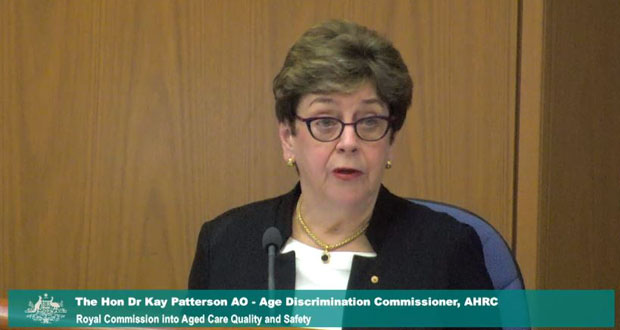“It is clear through my work as commissioner that older people are not always valued.”
This is the opinion of Kay Patterson, Commonwealth Age Discrimination Commissioner and former Victorian senator who had a stint as state minister for health and aged care.
In her statement to the royal commission, Patterson said she believes there are a litany of reasons why we are seeing the mistreatment of elder Australians in aged care, such as poor representation in the media.
She cited a 2013 study by the Human Rights Commission, which found older Aussies are underrepresented in the media, and “are often portrayed as frail, weak, victims or in poor health”, and those surveyed believe that media portrayals of the elderly are “unfair”.
Those surveyed said the media reinforces these negative stereotypes and has had a direct influence on how they feel about the elderly.
Furthermore, 70 per cent of all Australians believe that age discrimination is prevalent in society, and 50 per cent think the healthcare system discriminates against older Aussies.
Negative stereotypes and discrimination can lead to “fear and dislike of older people”, and often times “neglect and abuse”, Patterson said. She told the commission that although concrete figures are hard to come by, estimates suggest elder abuse is experienced by between 2 and 14 per cent of older Australians.
Education and creating contact between generations can reduce this, and she points to projects such as the Centenarian Portrait Project By Teenagers, which promotes intergenerational friendships through art, as good examples.
Patterson said that it is important that people are fully aware of the rights of the elderly to ensure that abuse cannot occur, and that has been a big part of her work as the age discrimination commissioner.
“It’s looking at how can we educate older people about what their rights are in terms of what they should expect from the community, and it’s about also educating people about the negative effects of ageism – for example, how it impacts on elder abuse, how it impacts on people’s attitudes to older people and their treatment of older people,” she said.
Educating aged care residents, staff and legal professionals about rights in regard to power of attorney is imperative, according to Patterson; but most of all, aged care providers need to get away from the “tick-a-box” approach to care standards.
“I believe that we should have a ranking for best practice. And we should have a carrot for best practice. The aged care standards provide a minimum. We saw Oakden meet all of those old 44 standards and was failing. You can have the 20 rights on a wall, but if they’re not in the hearts and minds of the staff, you may as well not have them.”
Do you have an idea for a story?Email [email protected]
 Aged Care Insite Australia's number one aged care news source
Aged Care Insite Australia's number one aged care news source

